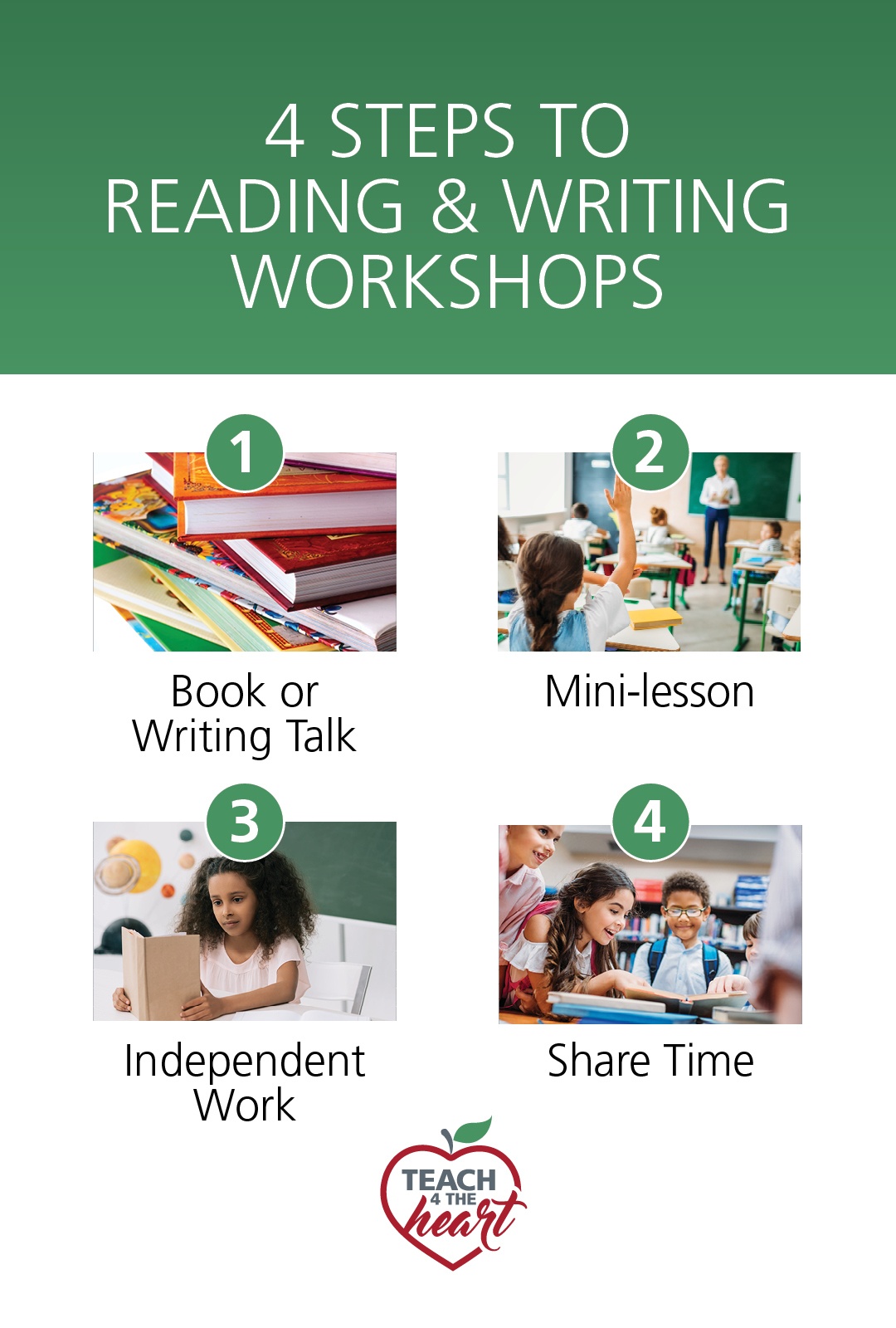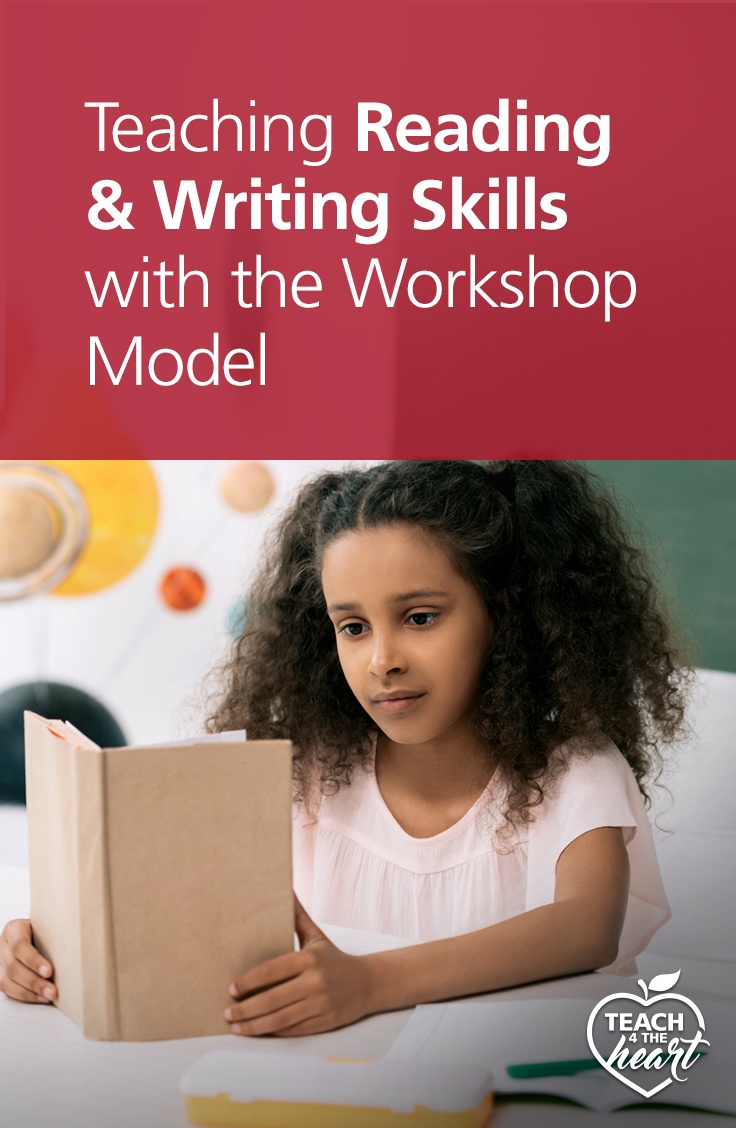If you teach reading or writing, you cannot miss this episode! Jen Bengel shares an easy-to-implement model that builds writing and reading skills and comprehension, and can be easily modified to work online!
listen here:
Subscribe to the Teach 4 the Heart Podcast.resources mentioned:
Sign up for this year’s summit: Rise Up Christian Educator’s Virtual Summit
Jen’s Website: Out of this World Literacy
Jen’s Free Notes and Support for the Reading Workshop
More trainings from Jen: Workshops
Why you should be using writing and reading workshops
If I told you there was a tool that would result in interest and engagement in reading, build community, and have built-in differentiation, would you be interested? Writing and reading workshops do all of this!
Workshops offer genuine conversation between students and teachers. Everyone has something valuable to share, not just the teacher, and students get to share their knowledge with each other. This keeps students more engaged because everyone is participating and it also creates a community of learners.
It also allows teachers to differentiate. In the whole group, you’re teaching the reading or writing grade level skill. Then, inside the workshops, students apply the grade level skill to books on their independent reading level or work on their own writing projects. Every student is able to operate on their individual level. These workshops also cultivate a love of reading because students get to pick the books they want to read.
Parts of a reading workshop
There are four parts to a reading workshop.
1. Book Talk
First, you’ll start the reading workshop with a book talk that is about 1-2 minutes total. Think of it as a book commercial or a movie trailer for books. Pull books from your class or school library that your kids will be interested in, but also think about what your students always read and which books you can feature to expand their horizons. For example, if your students always read fiction, pick some non-fiction books to showcase. Introduce them to the book and read them the summary or tell them what it’s about. You can put it in a special book talk bin so students can access it later. Students can also lead their own book talks featuring a book they have just read because workshops allow students to take the lead, rather than the teacher.
2. The Reading Workshop Mini-Lesson
The second part is the mini-lesson and this is 10-12 minutes long. This is whole group instruction hitting grade level standards and teaching a reading skill. You can sit in a semi-circle on the carpet so everyone can see each other and is on the same level. Have students them come with their reading notebooks.
When picking a topic for your mini-lesson, the statement needs to be very specific and narrow. Instead of talking about summarizing, talk about picking the main idea and using it to start a summary. It may take a whole week of reading skills mini-lessons to teach the whole topic of summarizing. Make sure to provide a “why” for what the students are learning.
Next, pick mentor texts, which are books you’ve already read to your class, and use them to practice the skill. Model using the skill for your students the first time, then have the students help you use the skill in a different text, and finally, the students turn to their partners and practice the skill with a third mentor text.
One tip to save time is to have the anchor chart and mini-lesson statement prepared ahead of time. You can cover parts of your anchor lesson chart until you get to that point in the lesson, rather than having students watch you write.
3. Independent time
Independent time lasts for 20-30 minutes. Students spend the time independently reading books that they’ve chosen and practicing the skill they just used. Even with different books; they can still practice the same reading skills (every book has a main idea, right?).
This time is not rigid; it could also be spent reading with partners, reading in small group with the teacher, having students in a literature group talking about their reading, or having students responding to their reading in writing. If a teacher notices a few kids struggling during whole group time, it doesn’t matter if they’re on different reading levels, she can call them all to a small group to practice the skill. This independent time also gives the teacher time for individual student conferences. A good goal is to see 3 students a day, so you’re seeing every student in your class every 2 weeks or so.
4. Share time
Finally, there is share time, which lasts 5-10 minutes. This is one of the most powerful steps to wrap everything up. Share time is fun for students! They turn and talk to a partner about what they wrote down or how they practiced the reading skill. It should be a different student than they talked to during the mini-lesson. The teacher spends this time listening in to check for understanding.
After partner time, the teacher has a couple kids share with the whole class. The teacher can use a clipboard with a sticky label for each kid and write down what they share. This is data to keep and bring to parent-teacher conferences, IEP meetings, etc. You can prepare the students for this by saying something like, “I’m going to write down what you say because I think what you have to share is important and I really want to remember it.” This is also a powerful strategy for motivating students to share. Be sure to call on different students each day so you have one piece of data from each student every week.
parts of a writing workshop
There are also 4 parts to a writing workshop and they are similar to the reading workshop ones.
1. Writing talk
The first step is a 1-2 minute writing talk, where writers share a few minutes of advice about writing. Students can share their advice to the class or you can find authors sharing advice on YouTube.
2. Mini-lesson
Next, there is mini-lesson for teaching a writing skill. It’s going to follow the same format as a reading mini-lesson with “I do, we do, you do.” Again, students are learning a grade-level skill in a whole group format.
3. The status of the class and independent work
Before students start doing their independent writing, the teacher does a quick “status of the class.” This is where the teacher finds out what each student is going to work on today and writes it down. Status of the class tells the teacher who might need extra help and is also allows students to verbalize their plan. The teacher can plan individual conferences according to this data.
Like with the reading workshop, students spend 20-30 minutes writing independently, using the skill they’ve learned in the mini-lesson, on whatever writing project they are working on.
One key point: teachers should be writing alongside their students. Whatever writing project the students are working on, the teacher should have his/her own version s/he wrote to use as a model to show the students.
4. share time
Share time follows the same format as the reading workshop and lasts 5-10 minutes. Again, the teachers takes data during this time.
Frequently asked questions
1. How do you make time for this?
You need about 45 minutes or more to do a workshop. If you’re low on time, you can use an A/B schedule where you alternate reading and writing workshops. You can also do the first two steps in a workshop before gym class, lunch, recess, etc. and then do the last two afterward.
2. Do you grade any of this?
You can grade about 2 assignments each week, but don’t tell the students which ones will be graded. Remember you’re also taking data every day during share time.
3. Is there anything else we should know?
Please remember that it takes a while to get good at running these workshops, so give yourself time. Start simply. Remember you’re building strong readers and critical thinkers who can apply these skills to their entire lives.
For more practical advice and encouragement like this, you’ll want to check out the Rise Up Christian Educators Summit. This blog post was originally a 2019 Rise Up summit session and we have so much more amazing information to share at the next upcoming conference.
about jen bengal
I am an educational author, who specializes in writing literacy curriculum and training teachers online through webinars, FB live, and courses. I trained with Irene Fountas and have a post graduate degree in literacy instruction. I founded Out of This World Literacy in 2012 and have been supporting teachers around the world in the best practices in literacy instruction.
spread the word!
Did you find this post helpful? Clue in your fellow teachers by sharing the post directly (just copy the URL) or by clicking one of the buttons to automatically share on social media.
This article may contain affiliate links. This means that if you purchase a resource after clicking the link, Teach 4 the Heart may receive a small commission at no extra cost to you. Thanks for helping support Teach 4 the Heart in this way.






I think it is a very good thing.